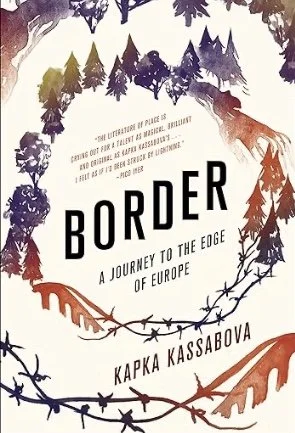Border: A Journey to the Edge of Europe by Kapka Kassabova (Graywolf Press)
Borders are mysterious and often troublesome divisions that shift according to political whims and military actions. Only continents, surrounded by oceans, seem to have borders that resist argument--except for the blurred and amorphous line that separates Europe from Asia. According to the National Geographic Society, this is “an imaginary line, running from the northern Ural Mountains in Russia south to the Caspian and Black Seas.” But to Kapka Kassabova the border between the two continents is found where “Bulgaria, Greece, and Turkey converge and diverge…where something like Europe begins and something else ends that is not quite Asia.”
If this definition has a tinge of magic to it, it’s because that’s what Kassabova finds along that hidden border. She grew up within its periphery and it calls to her from her home in Scotland. Alone, she returns to the part of Bulgaria that shaped her early life and begins an exploration that’s both spiritual and geographic. She wants to “see the forbidden places of my childhood…that had been out of bounds for two generations.” What she finds is Stranja, an unimaginable wilderness of forest and mountains, scantily inhabited, filled with legends, impermanence, and death.
The history of this part of the world goes beyond the years of the Iron Curtain, when Russian rule turned the region into a “forested Berlin Wall.” Stranja is where people ignore dangers to make a new life in other countries, running from the Soviet bloc, from the Balkan Wars, from Syria. If they’re lucky, they find guides who will lead them along the treacherous paths of The Road to Freedom--or they may end up in unmarked graves.
Kassabova begins her journey by staying still, in one place, in a village of 200 people where women are rumored to have the power of the evil eye, and firewalkers converge upon a sacred spring in an annual ritual that unites Christians and Muslims, Greeks and Bulgarians. “Beware,” she’s told as she becomes a fixture in the village. Stranja, she learns, is a place that’s hard to enter and is even more difficult to leave.
Yet Kassabova lingers there, learning the stories of residents, rediscovering myths, and finding details of lost history that may never have been true. As she delves into the past, the present becomes darker and she realizes “some things are beyond repair.” When she moves on, she’s haunted by the irreparable. “We are not Europe and we are not Asia,” an Eastern Orthodox priest tells her and his words are echoed in other ways by everyone she meets. Every village in Stranja is its own nation-state, created by its unique and repetitive history, and filled with “ a grieving sensation difficult to describe.”
In a village where people are famous for their longevity, Kassabova is accompanied by dogs that look like “shag-pile carpets on long legs” and as she eats a cup of sheep’s yogurt by the side of a road, a bear comes into view and vanishes into the undergrowth. Everyone she meets is given full voice in unforgettable character sketches, from the human-smuggler whom she flees from on a deserted mountain road to the beautiful woman who walked for a week to reach the Greek border and now lives on the Street of Widows, growing the roses that once were her dead husband’s favorite flower.
Border is a trip back into the past, a foray into the future, a quest for home. In this undefined part of the world, it doesn’t matter which continent claims the region. It’s a place people pass through in search of safety and they have done so throughout recorded time. Because she was born into it, Kapka Kassabova was almost reclaimed by it. What she found there the rest of us can only discover through her words in her strange, illuminating, and seductive book.~Janet Brown
